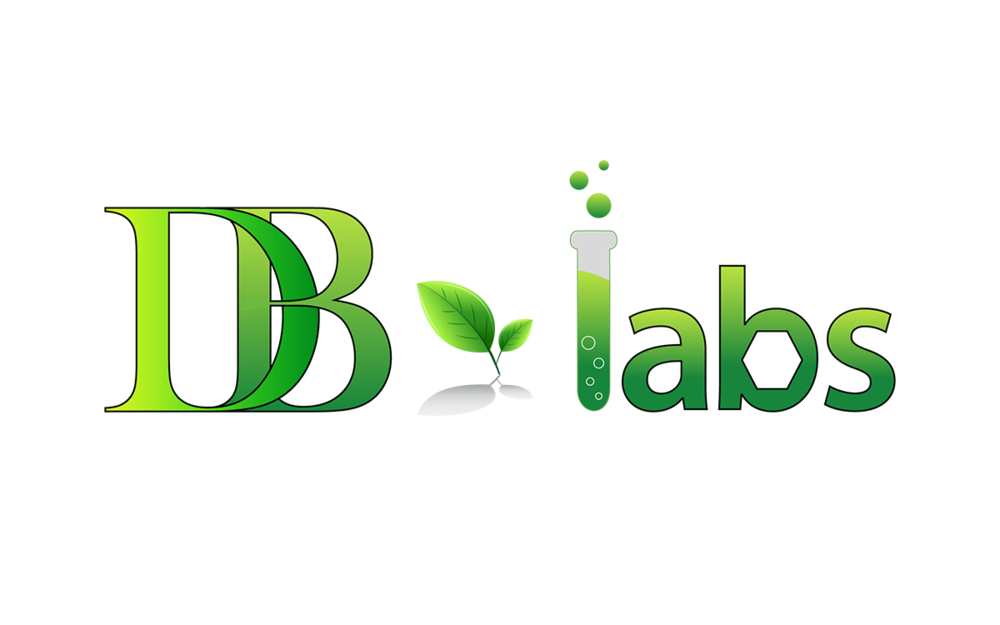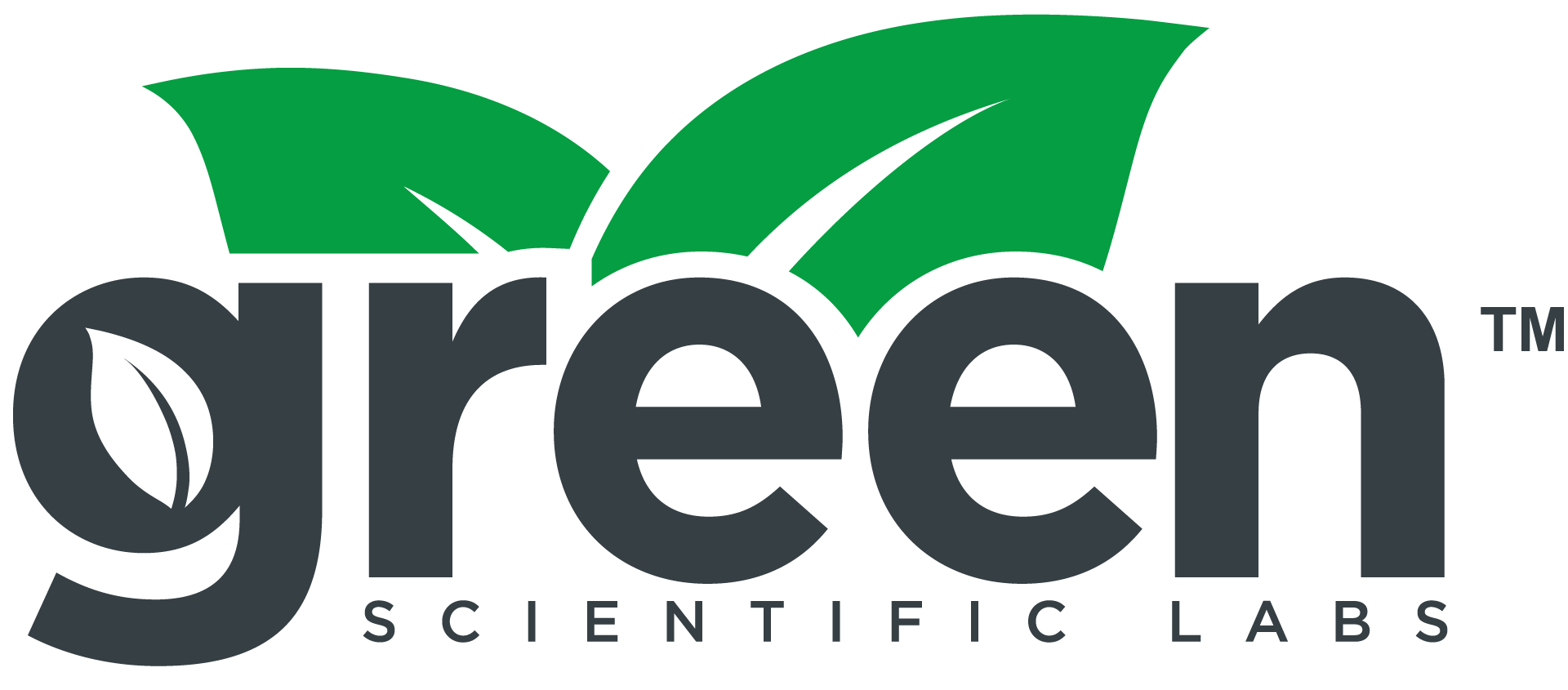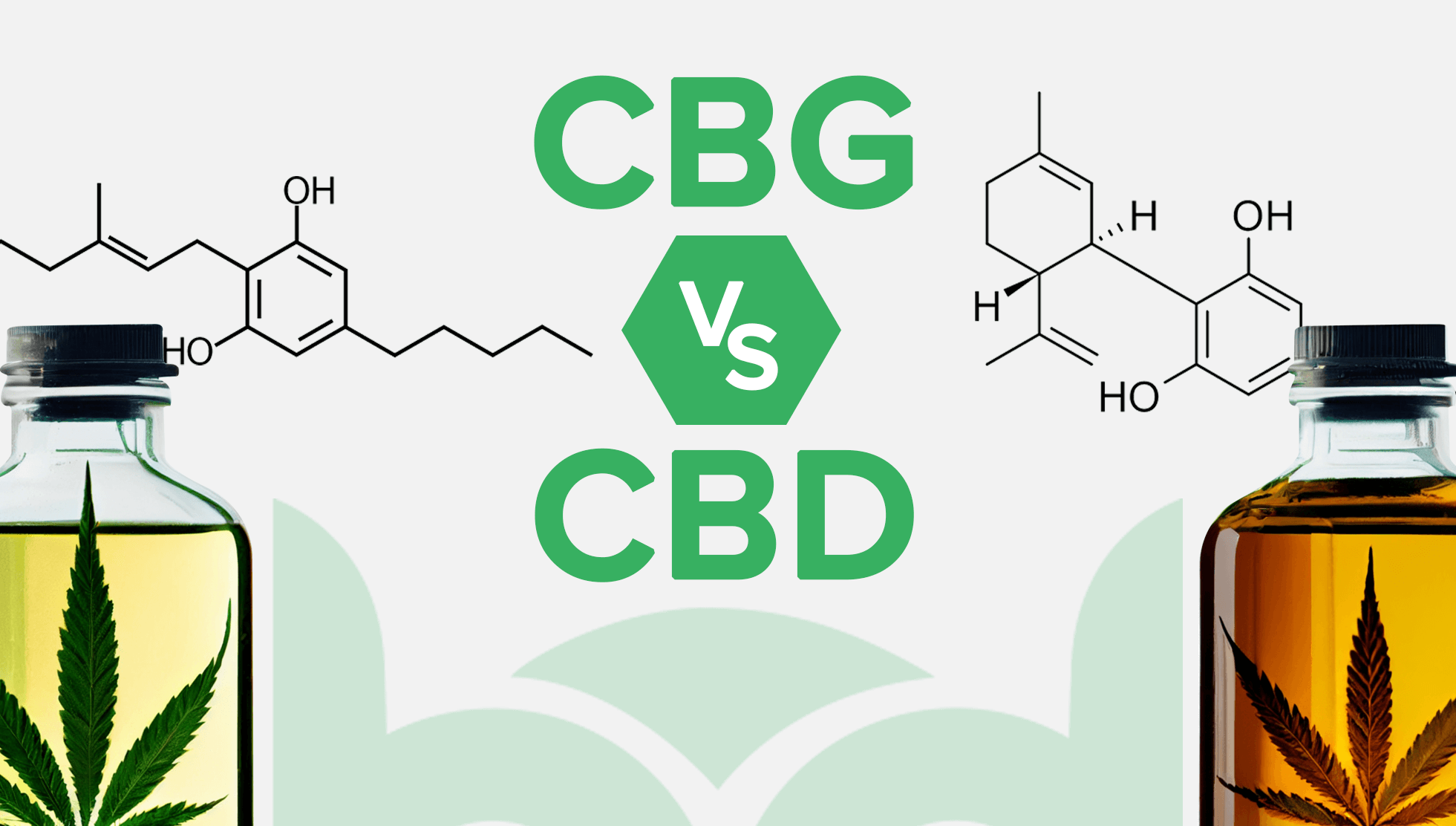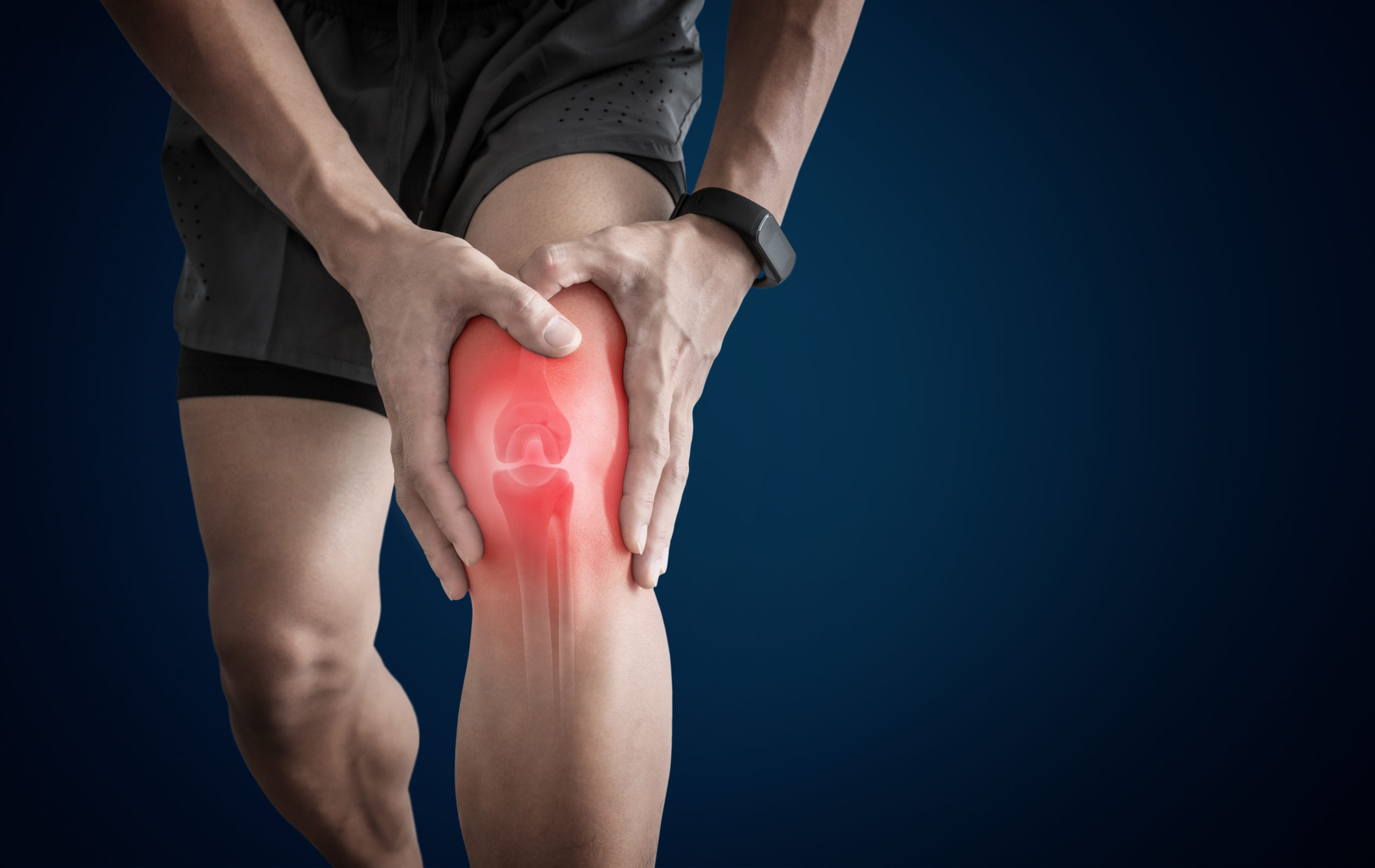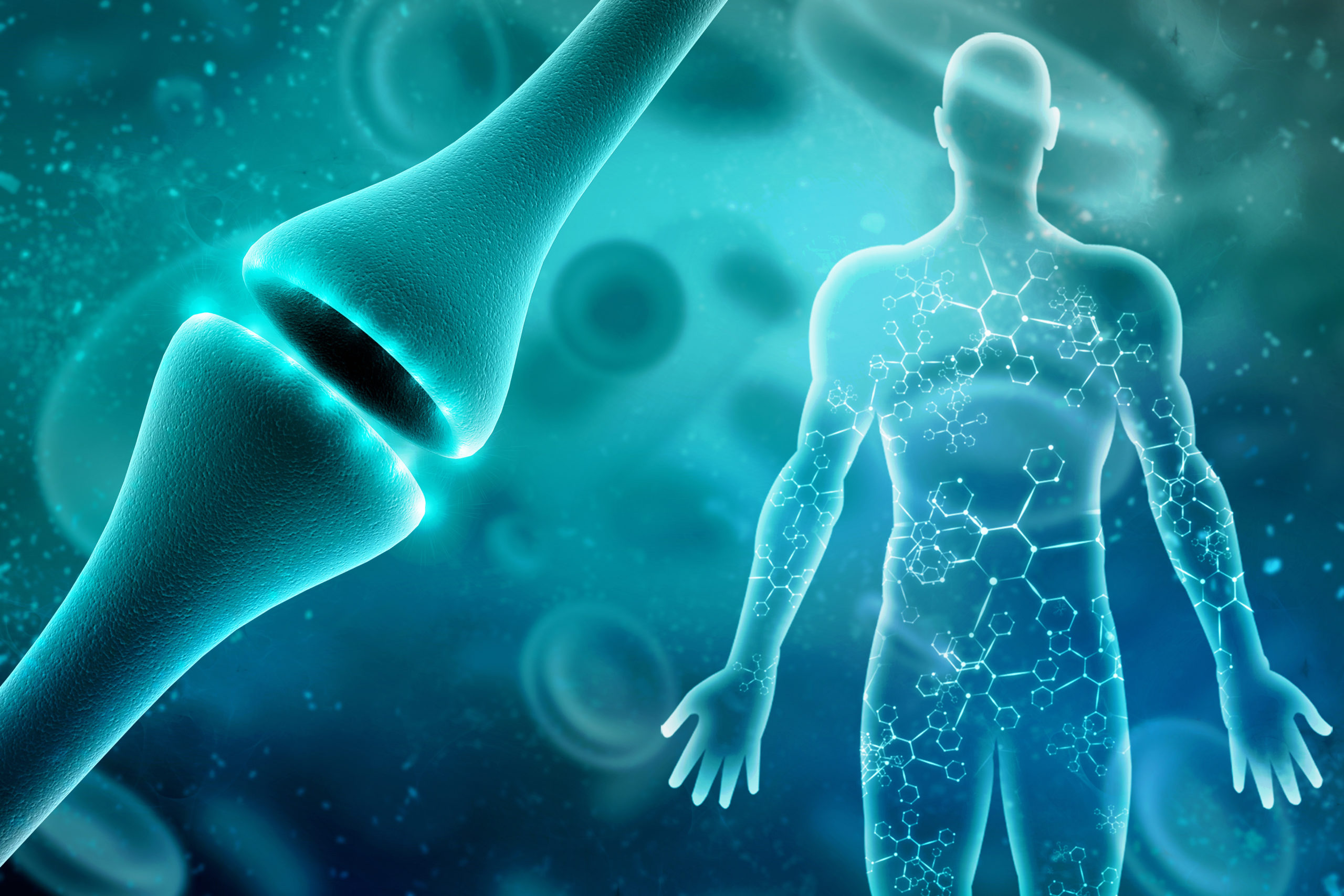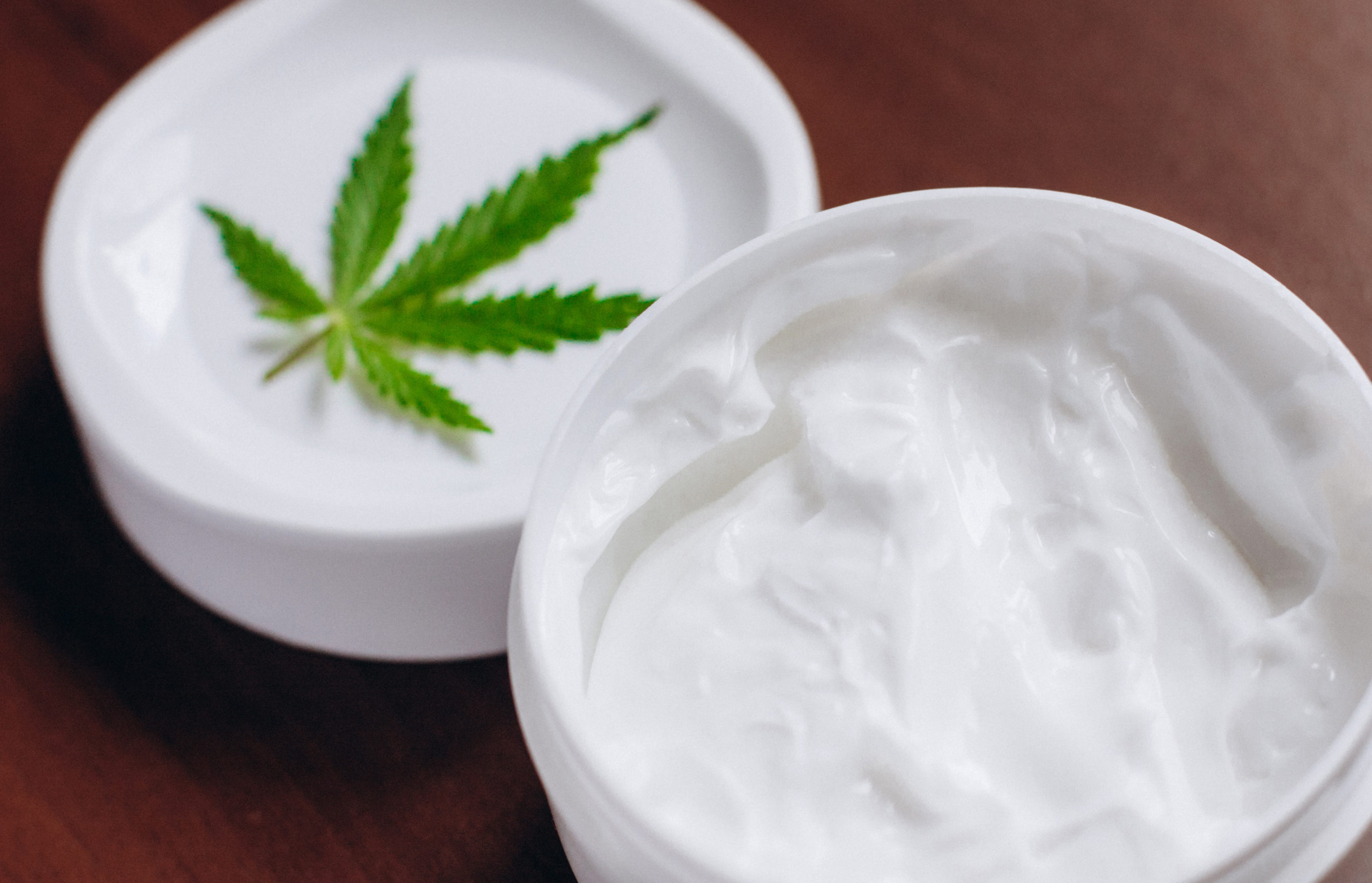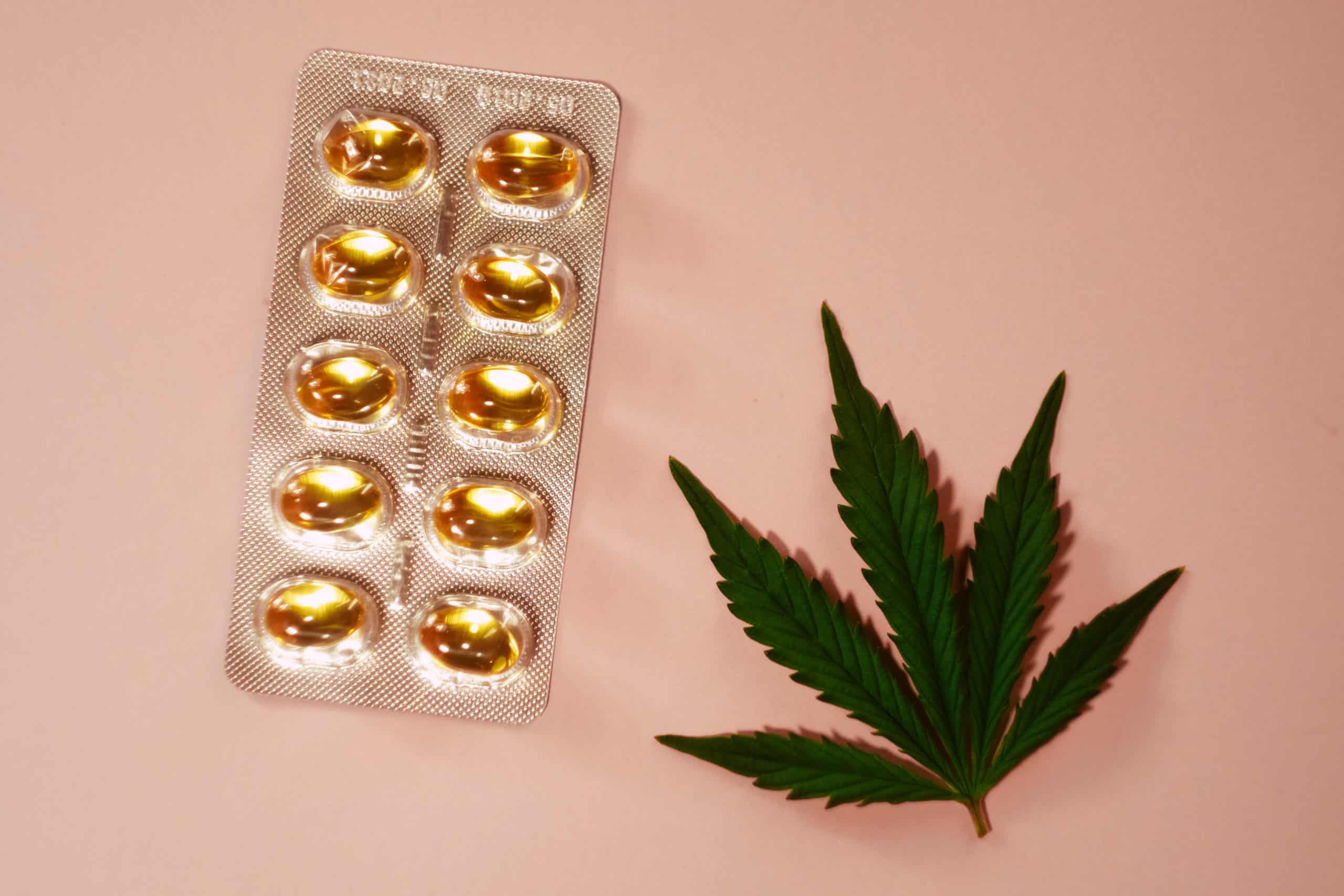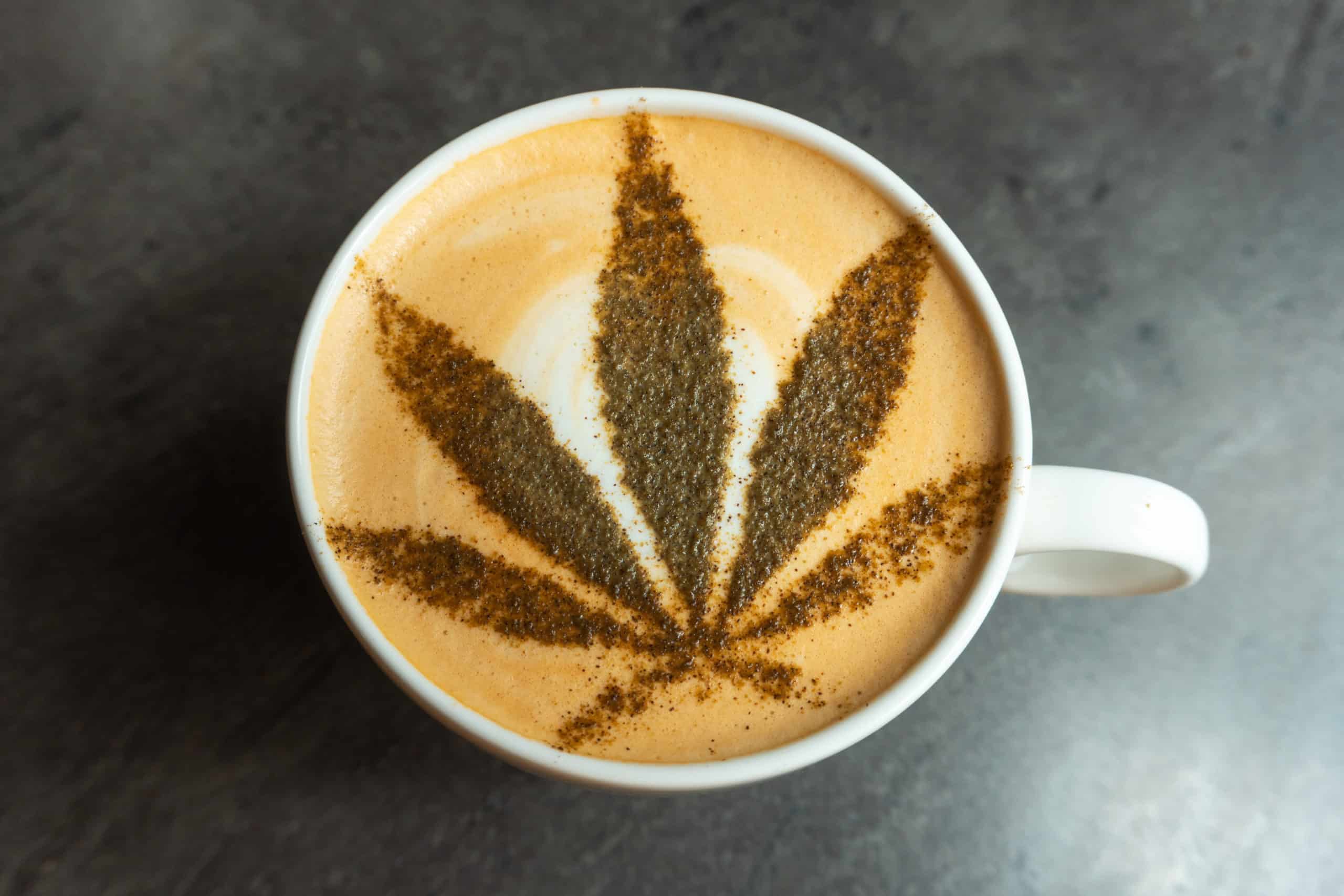-
- Market Research
- |
- CBD Near Me
- |
- Giveaways
- |
- Newsletter
- |
- Contact
- |
- Advertise
- |
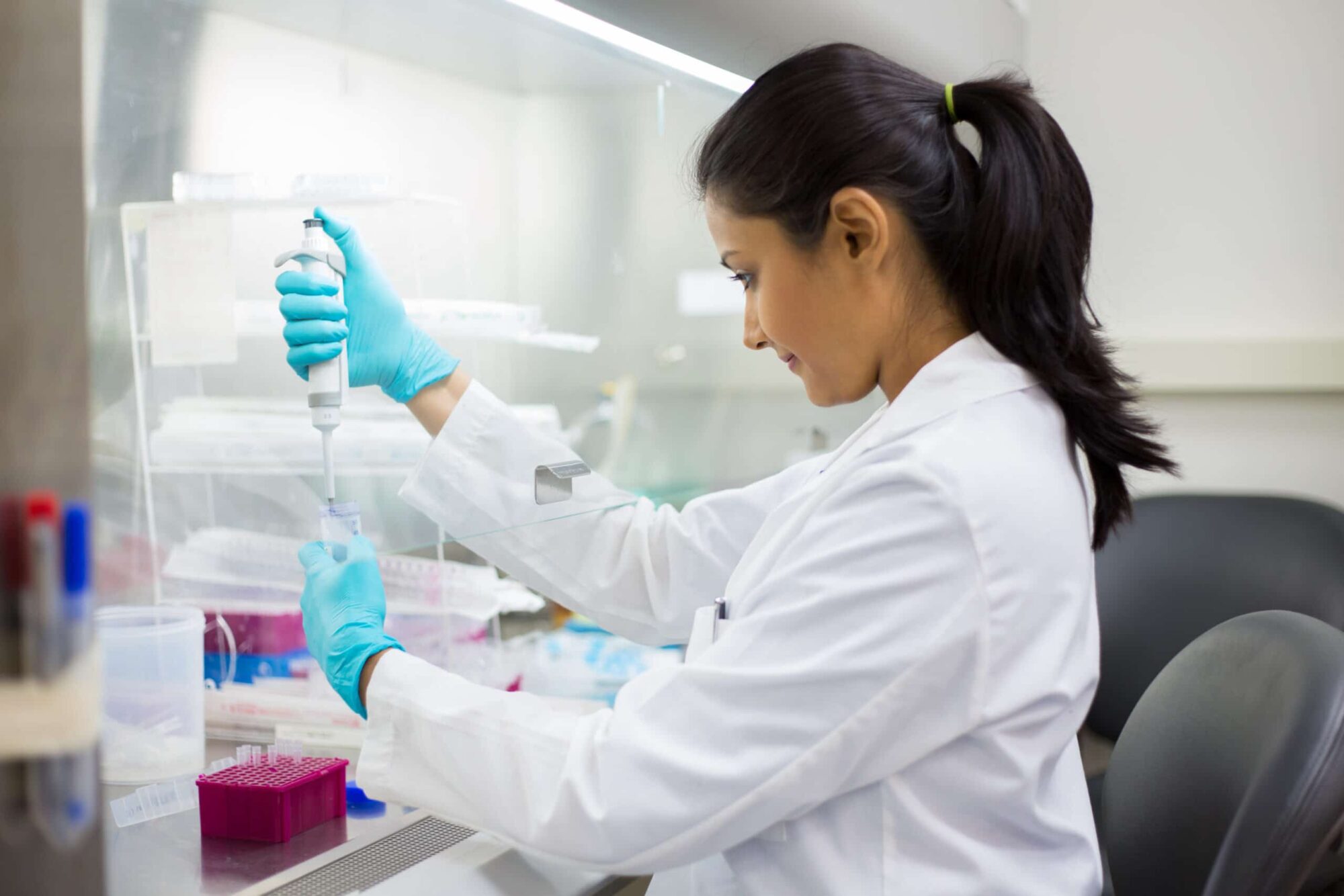
In the case of CBD and other cannabis-based supplements, accountability can’t stop at the product label.
Anyone can tout their product as the best source of x cannabinoids or the best product for a certain ailment, but it takes more than a tagline and a thumbnail-sized label on the back of a tincture bottle or a pack of edibles to discern between the many, many frontrunners in this industry.
Real insight in this case comes not from polished packaging, but from a well-documented, unbiased, and thorough certificate of analysis from a third-party lab.
CBD brands keep labs accountable, labs keep CBD brands accountable, and consumer demand brings the best products to the top of the market.
In order for this three-factored engine to keep pumping away for the betterment of the industry as a whole, consumers and brands need to understand what a third-party lab is, what defines a top-tier lab, and how they can interpret and apply data passed down from these facilities.
The Best Third-Party Labs in the CBD and Hemp Industry
ACS Laboratory
About ACS Laboratory:
Founded: 2008
Location: Sun City Center, Florida
Accreditation(s): ISO-17025, PJLA, & CLIA
Federal Compliance: Yes
Full-Panel Testing: Yes
Columbia Laboratories
About Columbia Laboratories:
Founded: 1996
Location: Portland, Oregon
Accreditation(s): ISO-17025, ORELAP, & Washington Department of Ecology Certificate and Scope
Federal Compliance: Yes
Full-Panel Testing: Yes
DB Labs
About DB Labs
Founded: 2014
Location: Las Vegas, Nevada
Accreditation(s): ISO-17025
Federal Compliance: Yes
Full-Panel Testing: Yes
Eurofins
About Eurofins
Founded: 1987
Location: Madison, Wisconsin (Hemp/CBD Headquarters)
Accreditation(s): ISO-17025
Federal Compliance: Yes
Full-Panel Testing: Yes
Green Scientific Labs
About Green Scientific Labs
Founded: 2018
Location: Davie, Florida
Accreditation(s): ISO-17025
Federal Compliance: Yes
Full-Panel Testing: Yes
What’s a Third-Party Lab Anyway?
Specifics vary based on jurisdiction, but like many other products within the supplement industry, CBD manufacturers must adhere to certain standards as it concerns their processes and end product quality/composition.
These standards often take the form of legally enforced limitations (often expressed in parts per million or a percentage) delineating the maximum safe amounts of heavy metals, pesticides, and other potentially harmful substances found in the product.
For ethical and logistical reasons, CBD manufacturers rely on third-party labs to certify that their products fall within safe levels in the aforementioned categories, which we will review in more detail below.
As the name implies, third-party labs are independently operated facilities that analyze and report on the quality of CBD products sent in by manufacturers.
The CBD brand sends their products to the lab, and after the lab runs certain tests on the products, they provide the brand with a Certificate of Analysis, or COA, so that the brand can have documented proof of their compliance and overall product quality.
Beyond checking the boxes legally, a glowing COA will also translate smoothly into positive consumer-facing messaging on product labels, advertisements, etc.
If concentrations of tested items are not up to code, of course, or if any other violations are found (i.e., foreign contaminants), then it’s time for the brand to make some changes to their formulations.
Making these changes can be very costly and time-consuming for CBD brands, depending on the nature of the change, which is why it’s so important for third-party labs to be highly accurate and forthcoming in their results.
Speaking of results, let’s take a closer look at what brands are looking for when evaluating third-party labs.
After you understand what exactly third-party labs do (or should do), you’ll be much better equipped to make your own evaluation of each lab in this report as well as the safety and quality of individual CBD products.
What Are Brands Looking for In a Third-Party Lab?
We asked this exact question to representatives at established CBD brands American Shaman, CBDistillery, CV Sciences/PlusCBD Oil, Lazarus Naturals, Medterra, Receptra Naturals, and Social CBD.
We’d like to recognize American Shaman, who responded to this question with a comprehensive list of standard operating procedures (SOPs) they use to evaluate and approve third-party labs.
The other brands we interviewed also had plenty to say on each of these items, so our format will loosely follow that of the American Shaman SOP approval document, working in responses from other labs where appropriate.
Accreditation
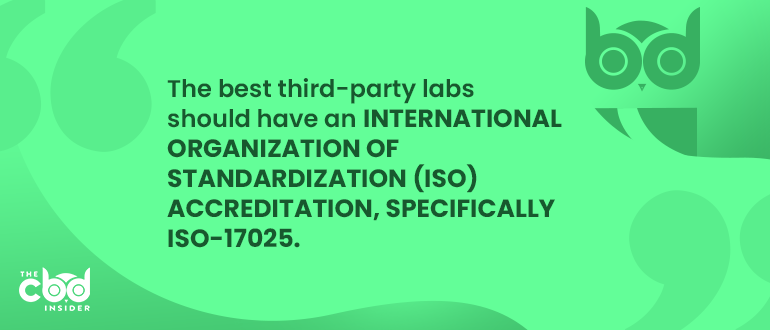
By far, this was the most consistently emphasized item echoed by every brand and lab we interviewed.
Specifically, brands in the CBD industry are looking for their lab to be ISO-accredited.
ISO stands for the International Organization of Standardization, and you can think of it as on par with the Better Business Bureau, but in this case, in a more technical capacity.
If your laboratory is ISO-accredited, it means that it has passed a close and rigorous evaluation across multiple standards, and that its practices are among the most effective and ethically sound in the industry.
Speaking of, CBD labs (and other kinds of labs) are looking for ISO 17025 accreditation specifically, because this is the designation for competency in testing and calibration laboratories.
Yet another distinction that discerning brands would be wise to make is to ensure that the laboratory’s entire panel of testing has earned this accreditation (and, of course, that the laboratory has a full panel of testing to begin with).
According to Andrew Hall, the Chief Scientific Officer at Green Scientific Labs, “The lab that a CBD brand chooses to work with should not only have achieved ISO 17025 accreditation, but should have done so for all tests they offer. This can be identified by reviewing their ISO certificate.”
Whether it’s consumers and product labels, brands and COAs, or brands and third-party labs in general, the theme of the day is taking a closer look beyond the big, bold letters and into the fine print—and it starts with the ISO certificate.
SOPs and Testing
We’ve strongly hinted a few times now at the importance of offering a full battery of testing as a CBD laboratory.
In addition to accreditation, this is how you separate a lab that is fully committed to CBD testing from a less experienced and well-equipped generalist simply trying to pivot into a growing market.
According to Jade Mitchell of American Shaman, full-panel testing in the CBD industry “is a full analysis of the product, which includes cannabinoid profile, terpene analysis, heavy metal analysis, mycotoxin report, residual solvent report, and pesticide analysis.”
To address some of the more technical items for anyone not in the know, mycotoxins are harmful fungi, residual solvents are potentially harmful chemicals not fully consumed in the CBD extraction process, and cannabinoids/terpenes are the compounds you do want to see in CBD products.
It is technically possible to possess an ISO accreditation and not offer full-panel testing, which is why this step is very important.
In a nearly unnavigable regulatory landscape, it’s also critical that companies from multiple jurisdictions anchor down as many set standards as possible, even if their governments won’t.
Even after a brand has checked for ISO certification and full-panel testing, it’s important to understand that not all SOPs are created equal, and that the specificity of the numbers themselves is a key indicator of high-level practices.
Accuracy and Readability of Reports
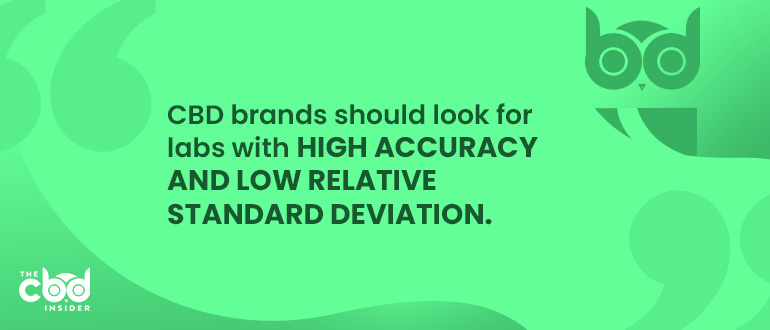
In many contexts, we humans are prone to making approximations in the interest of saving time, but that can’t be the case with CBD lab reporting.
We’ll mercifully glaze over the finer points of the statistics lecture, but it is imperative that brands and manufacturers alike uphold strict standards when it comes to the accuracy of the numbers themselves, which means keeping standards high in the following areas:
Limit of Quantitation (LOQ): Joseph Keil, VP of Operations at Medterra, spelled this out explicitly for us. “Ability to test to a 10 ppm LOQ/LOD” is how Mr. Keil phrased it. If a lab cannot detect substances at concentrations this low, then Medterra will likely not choose to work with them. Think of the limit of quantitation as the magnification level on a microscope; it’s the absolute smallest amount of a substance that a lab can confidently test for and report.
Relative Standard Deviation (RSD): This refers to how tightly data points are clustered around the mean. A high RSD is not what you want in an analysis, because this means there are many outliers in the data, indicating poor and inconsistent testing methods. It’s impossible to fully eliminate error, but a 5% or less RSD is commonly used as the standard.
Revisiting the lab approval document from American Shaman, when it comes to what exactly brands are looking for in terms of the figures they want to see on laboratory reports, these values top the list:
- Cannabinoids by weight percentage (individually)
- Cannabinoid concentration by mg/ml
- Total CBD
- Total THC
- Density of solution
- (Per above) terpenes, mycotoxins, pesticides, etc…
We say “total” CBD and THC because both of these compounds have chemical precursors known as cannabidiol acid (CBDA) and tetrahydrocannabinolic acid (THCA).
Finally, even the most accurate and sophisticated report in the world will be lost in translation if it isn’t digestible by CBD brands and the general public.
This isn’t to say that labs should omit or alter data in any way, but that they need to clarify and organize the results so that readers of all education levels can find the substances they’re looking for, easily interpret the concentration values, and move forward without having to research outside sources.
One of the third-party laboratories we interviewed, DB Labs, even offers a communication portal that allows the public direct access to lab faculty, a feature that most other labs don’t offer.
Pricing
The issue of pricing is less straightforward than it sounds in the case of third-party CBD labs.
When sacrificing quality is not an option, as is the case with a mass-produced supplement, pricing becomes more of a litmus test for quality than it does an opportunity for CBD brands to save a few dollars.
To reference Andrew Hall of Green Scientific again, “Good science is not cheap; instruments are expensive, quality scientists require competitive salaries, etc…you should be prepared to allocate nearly 5% of your monthly operating budget for testing.”
In other words, while competitive pricing is a key factor for healthy growth in any industry, CBD brands should look for a good deal, not a “something’s not right here” deal.
Even ballpark figures are very difficult to produce, given the many factors that make each brand’s submissions to the lab unique, like the form of the product, how many samples need to be analyzed, etc., but with the 5% rule and a diligent price-quoting campaign, brands can garner a much better sense of what quality labs charge.
Lead Time
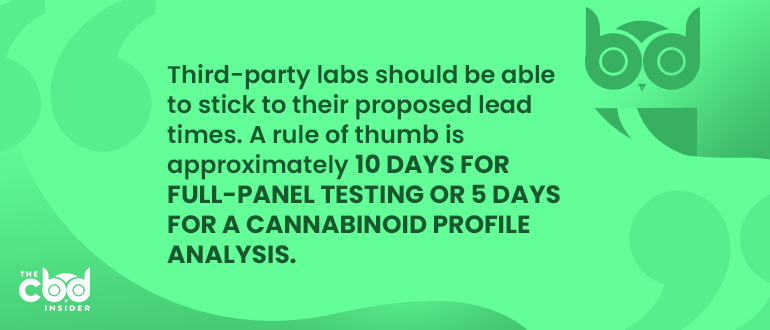
This term simply refers to how long it takes for a lab to analyze samples and return a certificate to the submitter after samples have been received.
Like pricing, CBD brands, of course, prefer this value to be lower, but if it’s too low, that’s an indicator of rushed or sloppy practices, especially in full-panel testing.
To help brands gauge whether or not a promised turnaround time is too low, Christopher Whaley, VP of Operations and Chief Scientist for Receptra Naturals, warned us about “A lab that promises a turnaround time that is shorter than the test cycles for analytes.”
Per the American Shaman lab-approval SOP document, a lead time of approximately 10 days for full-panel testing or 5 days for cannabinoid profile analysis is acceptable.
Cainan Garcia, VP of Operations at Lazarus Naturals, provided another useful insight relating to lead times that brands can use to assess the quality and reliability of third-party labs.
“A lab that is unable to maintain promised lead times due to poor internal communication is a major red flag,” Garcia told us.
If complications arise that require more submissions or additional tests, that’s an understandable part of the process, but this needs to be communicated so that the brand isn’t left hanging as the lab misses the promised deadline.
Reviews
Even though they occupy a more technical, less consumer-facing position within the CBD industry, third-party labs still serve a rapidly growing consumer base: CBD brands.
There’s much more at stake for a CBD company investing in a third-party lab than there is for a tourist spending a night in a hotel, which is why reviews in this business-to-business layer tend to be a little more earnest and a little less, shall we say, free-handed than your average reading experience on Yelp.
As such, they provide an even more valuable and reliable resource for CBD brands looking for as many points as possible to use when evaluating third-party labs.
As always, no single review captures the entire experience, so it’s best to read at least a dozen, seeking out both ends of the spectrum (positive and negative) if that’s an option.
Compliance
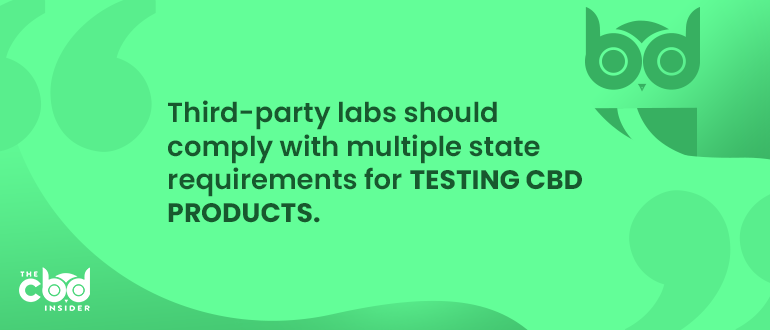
There are multiple layers to the compliance issue when it comes to not only the production and testing, but the sale of CBD as well, and it all occurs at the state level.
Some states don’t impose regulations on the testing process itself, while others are more strict.
CBD sellers looking to distribute nationally, then, have to find a third-party lab with a large enough battery of available tests to satisfy as many states’ regulations as possible, a high standard that Joseph Jefferies of CBDistillery prides his team on maintaining.
“Difficult regulatory environments are welcomed by our laboratory,” Mr. Jefferies said. “We look to allow our clients to go beyond compliance, so we’ve hand no trouble exceeding the shifting regulatory standards across the country.”
Even in the seemingly simpler case of same-state distributors, the current regulatory climate surrounding CBD is volatile enough to keep lab managers plenty busy as new standards are constantly being revised, removed, or otherwise altered within that state.
This brings us to an important side note that ties in with our earlier comment about emphasizing the consistency of an individual lab’s results (low RSD, remember?) versus looking for the same numbers from multiple labs: Without a national standard for testing, lab results will vary dramatically.
If you’re a CBD brand, you should be asking labs that you are interested in to demonstrate their compliance with state jurisdictions in your active regions.
A good lab will have a deep enough reservoir of different testing methods available to achieve compliance within their state, but a great lab will have even more to accommodate for both out-of-state distribution and shifting local guidelines.
Red Flag Issues
It’s already apparent by now that lead times and pricing can go either way, as in, a fairly priced testing service and reasonable lead time make the lab look reputable, where inconsistent/long lead times and extremely low or high rates raise red flags. Still, those aren’t the only items to look out for.
We asked the brands as well as the labs we spoke with about what they consider to be red flag items as it concerns a lab’s policies, practices, etc., and here is what they said.
Lack of Transparency
Three interviewed brands, including Lazarus Naturals, American Shaman, CV Sciences/PlusCBD Oil, and one lab, Green Scientific Labs, flagged communication and transparency issues as a major indicator of sub-par practices.
To quote CV Sciences, “Having a partner lab that is responsive and easy to communicate with … makes the testing process flow more efficiently.”
Third-party labs should be eager to give CBD sellers a close look at their procedures; if they aren’t, they’re creating the implication that they have something to hide, whether they do or not.
To provide a more common analogy, imagine if a used car salesperson tried to change the subject when you asked them to give you a look under the hood.
Thankfully, there are too many well-reputed labs out there, like those we are about to feature, for brands to have to deal with this kind of behavior.
If they aren’t upfront with you, then move on.
Zeros
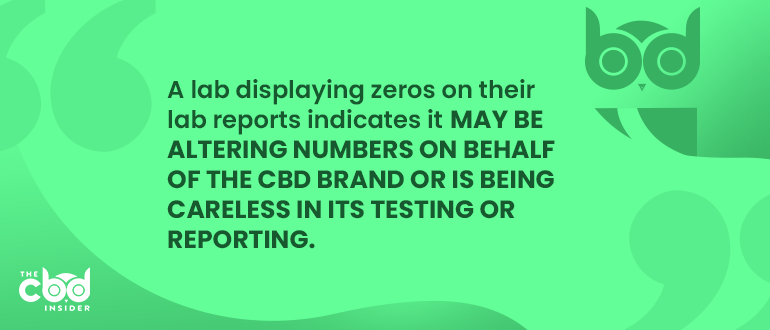
Remember how we said that a strong COA bodes well for marketing campaigns?
When it comes to dietary supplements, diet soda, and food products especially, we all know that brands love to sling around such superlatives as “highest x content,” “lowest y,” or even “zero calories, zero grams of fat,” and so on.
In the case of CBD brands, some have made the unwise decision to claim that their products have “zero THC” in an attempt to follow this highly relatable, time-tested approach to product labeling.
Even though any CBD product that meets federal requirements has only 0.3 percent or less of THC in it—not nearly enough to cause psychoactive effects in most people—it’s virtually impossible in any case to come up with a zero, since it may still be detected in a drug test.
If a lab arrives at this figure, meaning 0.00 milligrams, ppm, or percentage of THC (or other cannabinoids/substances), they are either trying to placate the brand by intentionally “fudging” the numbers or being careless in their testing and/or reporting.
Either way, if a brand sees a zero in the report without a discussion beforehand, or if the lab tries to cajole the brand into letting them “retest” so they can provide it with a zero THC value, then it’s time to select a new lab.
The Best Third-Party Labs In the Hemp-Derived CBD Industry
The reason we selected these labs to interview in the first place is we knew they were among the top tier of third-party labs out there, and that they would provide our readers with deep insights about what they do.
All of the brands mentioned in this report revealed to us which third-party lab they work with.
Below are featured key takeaways from our conversations with these labs, who were listed in no particular order, designed to enhance your understanding so that you can choose better products if you’re a consumer and better business partners if you’re a CBD manufacturer.
(Responses have been lightly edited for clarity.)
ACS Laboratory
ACS Laboratory
About ACS Laboratory
Founded: 2008
Location: Sun City Center, Florida
Accreditation(s): ISO-17025, PJLA, & CLIA
Federal Compliance: Yes
Full-Panel Testing: Yes
Notable brands working with ACS Laboratory include:
Founded in 2008, ACS Laboratory is Florida’s foremost tester of all things cannabis, reporting on seventeen kinds of cannabinoids, terpenes, moisture, and a broad field of pathogens/toxins that many competitors don’t include in their testing.
Drawing from their expertise as a clinical laboratory, ACS faculty developed their own testing methodologies to further refine their results while improving consistency in all instances, including edibles, distillates, crude oil, flower, and more.
Here’s what Account Executive Joseph Jeffries had to tell us:
What do you believe sets apart ACS Laboratory from others?
ACS Laboratory was a clinical laboratory prior to entering cannabis/hemp analytics, and still actively maintains those certifications, performing all tests at a medical level. Our in-house-developed methodologies and SOPs allow us to provide high-quality testing with reproducible results that our clients can depend on.
Are there any issues that the shifting regulatory/compliance landscape has caused for ACS Laboratory, or that have been difficult to navigate?
Difficult regulatory environments are welcomed by our laboratory. We look to allow our clients to go beyond compliance, so we’ve had no trouble exceeding the shifting regulatory standards across the country. We thrive in a regulated environment that most other laboratories are unable to compete with while delivering quality results.
We’re looking forward to the regulations putting a stop to labs providing false lab reports that favor manufacturers over consumers. Dependable, quality brands need dependable, quality labs like ACS.
What should CBD brands look for when deciding on a third-party laboratory to work with?
They’ll want to do their research into quality, long term laboratories with high-level SOPs. Not all laboratories are created equal, so it’s important to look into certifications, SOPs, and accountability to make sure you have a quality laboratory partner that works with your business.
What do you wish more CBD brands and/or consumers understood about third-party testing?
Laboratory testing is for the benefit of consumers, but can also help to streamline production and processes. An accurate lab like ACS Laboratory ensures the product purchased is safe for human consumption, and that it’s formulated and produced properly and accurately to the label.
What are some red flags that CBD brands should be aware of when looking for a lab to work with?
They should always try and audit and visit the lab. We also recommend splitting a sample to test the results against our lab’s results for comparison. If the lab offers to change the results based on the comparison… run!
What exactly has ACS Laboratory come across in terms of manufacturers trying to cut corners (or just making honest mistakes) with their formulations?
We’ve seen quite a few instances where formulations have gone wrong from cutting corners and it usually can be prevented just by validating suppliers and materials first.
We had one client who tested his hemp and had everything clean, then formulated, sent for another panel, and failed for pesticides. He had no idea what was happening but through R&D testing, we helped him uncover the contamination was from citrus terpenes he was adding in at the last step. Since citrus is less regulated, those terpenes had way more residual pesticides than legally allowed in hemp products.
We’ve also had a few clients who had ran into problems agreeing to work with new suppliers before personally validating their products. Shady companies can use shady labs, so we’ve seen instances where customers think they’re getting a 99% isolate, formulate their whole product line and test it, only to have results come back way off. They then retest the isolate and we’ve seen some come back as low as 17% CBD.
For consumers, it’s important to use the COA to verify products have been tested for full panels (rather than just potency) and make sure the potency is within 10% of the label claim’s content.
Columbia Laboratories
Columbia Laboratories
About Columbia Laboratories
Founded: 1996
Location: Portland, Oregon
Accreditation(s): ISO-17025, ORELAP, & Washington Department of Ecology Certificate and Scope
Federal Compliance: Yes
Full-Panel Testing: Yes
Notable brands working with Columbia include:
Long before CBD became popular, Columbia Laboratories was performing testing for nutritional and environmental sectors.
Social CBD told us that they chose Columbia because “they have been in operation for over thirty years, and are certified by both the Oregon Environmental Laboratory Accreditations Program as well as the ANSI National Accreditation Board to conform to the International Standards Organization (ISO) 17025 protocols for ensuring lab results are accurate and produced with reliable standards and methods.”
As a member of Berlin-based Tentamus, a global network of labs, Columbia has the ability to bring their clients a very wide range of testing services with the help of pooled resources from partner labs that independently operated labs can’t.
We spoke with Business Relations representative Kelly O’Connor, who had this to say:
What do you believe sets apart Columbia Laboratories from others?
Trust. To earn the trust of our clients, we stay focused on what matters most: representative, meaningful data. Columbia Labs offers legally defensible, seed-to-sale hemp testing in-house for various regulated markets’ specifications.
What does that mean? Our national clients can navigate the different regulated markets with legal confidence and representative COAs. They can rely on our numbers for accurate process formulation and ultimately know their label claims are representative of the carefully crafted, hemp-infused products.
Are there any issues that the shifting regulatory/compliance landscape has forced Columbia Laboratories to overcome, or that have been difficult to navigate?
We started testing for nutritional and environmental sectors more than 40 years ago. The CBD market is unique, as COAs determine the price of the commodity and legality of the products. We are, of course, talking about potency. Without national standardization of methods and regulation of testing labs, potency results can range wildly from lab to lab- and from product to product. To top it off, the acceptable range for accurate potency reporting is +/- 20%.
So, with the stakes so high, we must defend our data. And the best defense is a good offense; we go through extra lengths to provide quality control data, proficiency reports, validation studies and measurement uncertainty studies to prove our science true, time and time again.
What should CBD brands look for when deciding on a third-party laboratory to work with?
Choosing a testing lab to partner with is smart and a very important decision. It largely dictates business development, financial projections and legal liabilities, not to mention process formulation, marketing considerations and product development.
Set yourself up for success by taking the time to properly vet your third party lab, understand their capabilities and how they apply to your products/regulations. Call them. A good lab will save you money and work with you to structure your supply chain testing to enhance traceability.
At the least, make sure to vet your lab for:
- ISO accreditation—check the scope—make sure all of their analyses are listed.
- Experienced staff who have worked with cannabis/ hemp- it’s complicated.
- Proficiency reports and QC data—make them prove their claims for accuracy.
- An account manager—what kind of access do you have for support when you need it?
What do you wish more CBD brands and/or consumers understood about third-party testing?
Many companies consider third-party testing labs to be a necessary evil; a costly consideration that takes overhead and time, which sometimes leads to unfavorable results, sending them back to the drawing board. They might have had bad experiences with less-than-reliable results. So they delay choosing the right lab, or don’t research, trust or know the full capabilities of their testing lab. But vetting and collaboration can actually SAVE you time and money.
Your testing lab should be your greatest resource! We have a wealth of knowledge and data and compassion to support your R&D and distribution. Third-party testing IS necessary, but evil? Only if you see it that way.
What are some red flags that CBD brands should be aware of when looking for a lab to work with?
Hemp is complicated—on a chemical level—even more so when infused into products. So, keep in mind that quick and cheap science is, well, quick. And cheap. This is no time to be cutting corners. Turn-and-burn laboratories can cut corners without much consequence in order to offer superman-fast services for dirt cheap. Do a little digging and work with a lab that will outlast the CBD bubble to provide you with sustainable solutions.
What exactly has Columbia Labs come across in terms of manufacturers trying to cut corners (or just making honest mistakes) with their formulations?
If you manufacture hemp products, you likely formulate based on test results on their incoming materials (hemp extracts). This can be frustrating if the extract and final products are not tested at the same lab, as the results might not be what you expect.
For consistency’s sake, have all your incoming raw materials tested at the same lab at which you will have your final products tested. And if you want to go the extra mile, conduct a measurement uncertainty study to understand the reasonable parameters for your expected numbers.
Data is knowledge; knowledge is power; power creates profit.
If you are researching your brands, you are miles ahead—and on the right track! Now, what to hone in on during your search? Well, compliant, responsible CBD companies take pride in their sourcing and testing practices—look for those on their web sites.
Do they show lab reports per batch, or per SKU? Do you know where the hemp came from originally? For example, is it Oregon Sungrown Hemp or imported from overseas? These good guys are accredited so look for accreditations on their company information like cGMP and ISO accreditation.
And lastly, these pros focused on sustainable business practices and compliance, which means that they won’t be making any health claims and will include disclaimers on their products. If they claim to cure and/or don’t show disclaimers on their products, the focus is not on wellness, and is therefore not worth your investment.
DB Labs
DB Labs
Founded: 2014
Location: Las Vegas, Nevada
Accreditation(s): ISO-17025
Federal Compliance: Yes
Full-Panel Testing: Yes
Notable brands working with DB Labs include:
Gold-certified for more than 60 contaminants, DB Labs is the first state-approved third-party lab operating in Nevada.
In addition to offering full-panel testing that targets many specific types of mold and foreign materials (instead of just lumping them into a “foreign contaminants” category), DB Labs can provide growers and manufacturers with additional insights with plant sexing and DNA sequencing services.
We spoke with CEO Susan Bunce, Lab Director Dr. Benjamin Chew, and Benjamin Lerner, who had this to say:
What do you believe sets apart DB Labs from others?
Benjamin Lerner: Most folks know us for our strong service provided before, during, and after the reporting itself. We also have dedicated experience in this market since 2014. We have a high level of expertise in the field. Dr. Benjamin Chew is one of our PhDs, and we have other PhD- and master-level people (typically in chemistry or bioscience) on staff. This gives us a deep thought process, thanks to the experience of people who’ve already been doing this for multiple years in the CBD and hemp world.
We also have great client service features. We actually provide a communication tool, so clients can go right to the scientists, Dr. Ben, or Susan, with their questions instead of calling an operator and being put on hold.
Susan Bunce: The other thing we offer, since we have been in this industry for so long, is our ability to help clients with their formulations. If they’re new to this business and starting a gummy line, or whatever the product is, and are having difficulty hitting their target numbers, we can help them with that.
Everything is confidential with our clients, so they’re free to have a dialogue with our chemists to help them dial in what their processes are, and we can help them fine-tune to hit their targets.
Are there any challenges caused by the shifting regulatory landscape that your laboratory specifically has had to overcome?
Dr. Benjamin Chew: Yes, it is the lack of federal standards to unify everything across the US that has caused difficulties. There are different pesticide lists that each state has come up with, listing what levels each state has come up with, and that makes it very challenging not only for the lab, but even for the supplier when they’re trying to determine which testing standards they have to meet. Depending on what state you want to sell in, you’ve got to meet that state’s requirements.
Every time someone makes a change, that could mean a month or so of work for a laboratory to tune their instruments so they can address that change, ensuring they can get down to the right level for what is now required.
What should brands be looking for when they are deciding to work with a third-party laboratory?
Susan Bunce: I think they need to do their homework and interview the lab. Find out how long they’ve been in business. Are they ISO-accredited? Many labs are, but it’s important to dive deeper into the accreditation, asking if they’re accredited for everything they’re testing for. Some labs may be accredited for cannabinoids and terpenes, but not for pesticides, residual solvents, and all of the other things we do testing for here. So, brands need to go beyond simply asking if the lab is ISO accredited.
Benjamin Lerner: Other things they should consider, obviously, is “Can you meet my turnaround time?” The experience level needs to be explored. If you’ve just come onboard as a lab, you’re not going to have the breadth of the experience that we have as Nevada’s oldest laboratory.
Specialization is also really important. If someone has a gummy, a concentrate, or a flower, those require specialized tests and specialized focus on the part of the scientists, so you want to make sure the lab has the specializations needed to handle different types of products.
Susan Bunce: Right, and one other thing Ben touched on there is proficiency testing, which we also do through Emerald Scientific. We participate in that twice a year.
Can you explain what proficiency testing is?
Dr. Benjamin Chew: Proficiency testing is when you have a third-party company that will give you some materials that have a certain amount of pesticides, cannabinoids, or terpenes in them for you to measure. Or they’ll give you three vials, one of which has microbial contamination in it, for you to test. They’ll send these out to multiple labs.
Usually, they’ll organize a large study for this twice a year. Laboratories sign up for this, and the tester will send these samples out to them all at the same time. The labs run the analysis, send the results back to the company, who will then analyze everything and report on how close each lab was to the actual numbers. Laboratories can then say, on an unknown sample, they got within 3 percent or 5 percent of the correct or expected value.
What are some companies that run those proficiency tests?
Dr. Benjamin Chew: There are a couple out there. The big one on the cannabis side is organized by Emerald Scientific. It’s a big study they put together twice a year. It involves different suppliers, so in one study, the tester is dealing with cannabinoids and residual solvents I believe, and there’s another supplier that handles the microbial side of things.
They kind of all have their own expertise, so while it’s certainly possible for a laboratory to go to one of the individual companies at any time throughout the year to check on something specific, the Emerald one is more convenient. Twice a year, they organize a larger study that people can be a part of.
What are some red flags that CBD brands should be aware of when looking for third-party labs?
Benjamin Lerner: One of the biggest challenges people have, especially those new to CBD or hemp, is reporting. On the reporting side, people are looking for zeros when it comes to THC. “I don’t want any zeros in my THC—it’s supposed to be THC-free.” That’s a big red flag, because in analytical chemistry, as Dr. Ben can tell you, zero is not a number that a high-quality lab would put on a report; there are no true zeros.
Dr. Benjamin Chew: One of the things that I prefer to see from a good lab, like on our reports, is the phrase “less than LOQ.” LOQ is our limit of quantitation—the lowest level at which a laboratory is comfortable measuring. That might be 0.05% or even lower than that, it depends on the laboratory and how that experiment was run. A responsible laboratory should have something in the report saying, “We didn’t detect it in the sample because it was below our limit of quantitation. This is what our limit of quantitation is.”
Benjamin Lerner: If you want to go to a laboratory, whether it’s DB or someone else, they should at least have a minimum standard of ISO 17025 accreditation.
What has DB Labs come across in terms of manufacturers cutting corners or making mistakes?
Dr. Benjamin Chew: One thing that came up recently is actually finding lead in some of the materials.
This actually came from the packaging. We had tested the bulk material, and it looked fine, but when they sent us a finished bottle of the material, we were consistently finding lead at pretty high levels. We went back and double-checked everything, including our numbers and analyses, and then finally, when we took a closer look at the bottle, there were some markings on the inside of the dropper. We scraped off some of the markings and analyzed those, and that’s where the lead was coming from. We traced it back, and it turns out the company had recently changed their supplier.
We kept asking if they had any COAs from their supplier showing that they tested the bottles for lead, but nothing they could produce showed the bottles had been tested for lead. Unfortunately for the brand, they had to destroy a lot of the material at the very last step because of this.
Benjamin Lerner: Going back to the lead issue, this has affected more than just one client. This is a national discussion, because most of those graduated dropper marks Dr. Ben is alluding to come from China. When things are mass produced like that without a quality check, the supplier may not have a COA for their bottle.
Susan Bunce: The other thing they can do if there’s ever a question is that they can always send it to us for analysis as well, both the finished product and the container. We can also do swab sampling to check for microbials.
Another thing we have ran across are companies forging certificates of analysis and selling their products from a certificate that is not for their product. If a Certificate of Analysis looks like it has been copied and pasted or pieced together at all, you should call the laboratory that did the testing to see if it matches the product.
Would you recommend that brands check their suppliers with you before finishing their formulations?
Dr. Benjamin Chew: If you can produce a COA from them that says they did the testing. I guess the question is whether or not you believe that COA. If you believe you’re ordering from a reputable company, and they guarantee this, that kind of gives you an out as far as who was responsible for the material having to be destroyed. There certainly are some companies that take COAs with a grain of salt and perform independent tests in addition.
Susan Bunce: I think it’s better to have that sort of expense as opposed to the alternative, which is to have an entire batch fail. It’s a much bigger cost at that point.
What is something you wish CBD brands and/or consumers would be aware of in regards to third-party testing?
Benjamin Lerner: The biggest thing is that all labs are not created equal. As a consumer or as a production facility, you need to check out the laboratories that you’re going to select carefully. You can ask other producers you know about the labs they use, then do your fine-tuning. Is it ISO-accredited? That’s another item you would look for.
Susan Bunce: Also, if they’re in a position to check out the labs in person, asking if the lab faculty would be willing to do a walkthrough. Really do a whole interview process. If it’s a situation where they can’t see the laboratory, try to ask a lot of questions, like how long they’ve been in business. Talk to the chemists, ask them a lot of questions.
Dr. Benjamin Chew: One of the things I would point out after speaking to a lot of consumers and producers is that a lot of people want to have reports that say zero. That’s somewhat unrealistic. We are talking about a natural product that grew out of the ground, so there’s going to be a little background of something in there.
If you think about it, spinach has lead in it. Some people don’t like to see even a tiny trace of something in there, and they’ll say, “You’re poisoning me!” We can pick up trace amounts of elements at very small quantities, and if it’s above our LOQ, we will report that number. Some people don’t like to see any number there, but we have to explain to them that it came from a plant, which can be tricky.
Susan Bunce: Just to add one more thing. I think that would be a great question for someone to ask a laboratory if they would put in a zero. If the reply is, “Yes, we would put in a zero for you.” That may show that they are not an ethical lab.
Eurofins Scientific
Eurofins
About Eurofins
Founded: 1987
Location: Madison, Wisconsin (Hemp/CBD Headquarters)
Accreditation(s): ISO-17025
Federal Compliance: Yes
Full-Panel Testing: Yes
Notable brands working with Eurofins:
Represented in more than 50 countries around the globe with 800 sites and counting, Eurofins Scientific performs thousands of analyses relating to consumer product testing, agroscience, food safety, and more.
In addition to their experience testing very large product samples, Eurofins will also assess and report on your company’s manufacturing methods if you so request.
Here’s what Gregory Yudin, a Product Marketing Manager at Eurofins, had to tell us about what makes this lab unique, how they stay ahead of shifting regulations, and more:
What do you believe sets apart Eurofins from others?
We believe that what sets us apart at Eurofins are our people. We truly have an outstanding group of dedicated scientists, subject matter experts, customer service and account managers across our organization. In the hemp space specifically, we have employees on technical committees —such as AOAC—that help drive new industry standards for testing methods. Our employees also participate in industry organizations such as the US Hemp Roundtable, Hemp Feed Coalition and Hemp Industries Association.
We are invested in the success of the hemp industry and will continue to advocate for the use of scientifically sound methods to support the availability of safe products for consumers.
Are there any issues that the shifting regulatory/compliance landscape has caused for Eurofins, or that have been difficult to navigate?
At Eurofins, we always ensure we are fully compliant with all state and federal regulations, so we have been keeping a close eye on the evolving regulatory landscape. One challenge that we recently resolved was being able to perform testing on hemp extracts.
We took the step to register our lab with the DEA, and we have strict SOPs in place for when a sample tests above 0.03% THC. This was a big step for us because it truly allowed us to offer seed to shelf testing.
What should CBD brands look for when deciding on a third-party laboratory to work with?
Transparency is the most important feature of identifying a reputable lab. A lab should be ready and willing to share as much information as they are able too with you. They should be open about their accreditations, quality programs, data collection and reporting, capacity, turnaround times, and method validations. A testing lab is an integral partner to your business; you should walk away from an audit feeling like the lab is invested in your success.
What are some red flags that CBD brands should be aware of when looking for a lab to work with?
Like most things in life, if the price is too good to be true, it’s probably because it is. Setting up and maintaining a high quality lab that complies with all current state and federal regulations requires a substantial investment. Also, following up on our answer to the previous question, if you ask about testing methods, method validation, or accreditations, and a lab won’t share that info or claim it is proprietary, that is another red flag.
What is something you wish more CBD brands and/or consumers understood about third-party testing?
One important piece of information that we don’t feel is discussed enough in the CBD testing space is accreditation and method validation. When it comes to accreditations, it is important to remember that, not only should the lab facility be accredited, but also, the individual test methods being performed should be validated. The minimum requirement is to ensure the laboratory runs analyses under ISO 17025.
Method validation ensures a test method can be used to accurately detect the component in question in the specific product being tested. As an example, one test method will need to be validated to detect CBD levels in dried flower, and a separate method will need to be validated to accurately detect CBD in a hemp extract. The main takeaway is that there are no one-size-fits-all methods.
Green Scientific Labs
Green Scientific Labs
About Green Scientific Labs
Founded: 2018
Location: Davie, Florida
Accreditation(s): ISO-17025
Federal Compliance: Yes
Full-Panel Testing: Yes
Notable brands working with Green Scientific Labs include:
Green scientific merges extensive experience in the agricultural laboratory industry with their data- and technology-driven approach to provide clients with quick, clean, and consistent results.
Operating out of Davie, Florida, this laboratory provides full-panel testing, including full cannabinoid profiles, foreign material analysis, and more.
We spoke with the already introduced Andrew Hall, Chief Scientific Officer, who had this to say:
What do you believe sets apart Green Scientific Labs from others?
Our mission has always been to ensure that only the safest products reach the hands of consumers in the marketplace. To accomplish this, our approach from inception has been threefold; to provide the most accurate results in the cannabis industry, utilizing cutting edge and proprietary technology while offering the best customer service and overall client experience.
Are there any issues that the shifting regulatory/compliance landscape has caused for Green Scientific Labs, or that have been difficult to navigate?
I believe that it is more challenging for brands to navigate the various regulations. One of the biggest challenges that exists today is the lack of standardization across state lines when it comes to contaminant testing. Some states only require potency testing to ensure D9 THC is below the legal limit of 0.3%. Other states require full-panel testing. One state might require testing for 48 pesticides while another state requires screening for 67 pesticides. Some states require random microbials, i.e. listeria, that no other states require.
If you have aspirations of becoming a national brand that sells into all states (where CBD is legal), it is important to work with a lab that stays current with all state rules and can issue a compliance report that protects the brand regardless of where the product is sold.
What should CBD brands look for when deciding on a third-party laboratory to work with?
The first thing that a brand should look for when it comes to a potential lab partner is ISO 17025 accreditation. ISO 17025 is the international standard for testing and calibration laboratories. It is a set of requirements those laboratories use to show that they operate a quality management system, and that they are technically competent to do the work that they do. The lab that a CBD brand chooses to work with should not only have achieved ISO 17025 accreditation, but should have done so for all tests that they offer. This can be identified by reviewing their ISO Certificate.
What do you wish more CBD brands and/or consumers understood about third-party testing?
This might sound silly and self-serving, but I would be very weary of labs that are offering prices that seem too good to be true. If you truly want to bring the highest quality product to market, you need to work with the best labs. The brands that cut corners are the ones that will not last.
What are some red flags that CBD brands should be aware of when looking for a lab to work with?
Lack of transparency is big in this industry. We believe it is important to take on the role of a partner versus that of just a vendor. A top-tier lab should have no problem sharing information about their quality control systems, methods and/or SOPs (with the proper NDAs signed of course). If a lab is not willing to discuss these items, I would proceed with extreme caution.
What exactly has Green Scientific Labs come across in terms of manufacturers trying to cut corners (or just making honest mistakes) with their formulations?
One of the areas that I have seen cause issues with manufacturers is the reliance on the COA from the supplier of their raw materials. I understand that as a compliance lab, we are a necessary evil, however, trying to save a few hundred dollars by NOT testing the raw material and relying on a COA that was provided to you can have a crippling effect on your business.
Not all labs are created equal, and if you start the manufacturing or formulation process based on raw ingredients that perhaps are not as potent as you thought or even worse, contain contaminants that the original lab was not able to identify, you run the risk have wasting large sums of money or potentially producing products that are harmful to consumers.
Bringing It All Back to the Consumer
Now that we’ve covered what third-party labs do, how brands select them, and what constitutes quality reporting, it’s time to translate all of this into actionable tips for consumers trying to decide between competing CBD brands.
Consumer demand is the driving force for all of this in the first place, so the more educated the general public is about how to demand accountability of their CBD providers and the labs that approve them, the more quickly and efficiently those standards will be realized.
At the very least, this effort requires checking certifications, reviewing COAs, and familiarizing yourself with local and federal guidelines.
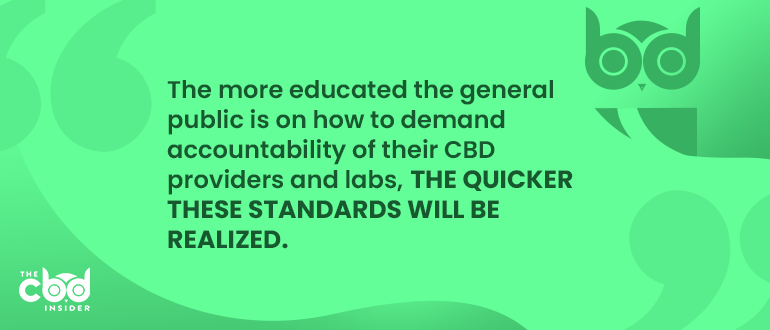
Show Me
It’s the simplest, fastest way to weed out CBD brands that you don’t want to work with: checking the labs that analyze their products for ISO 17025 certification.
The brands mentioned above all require ISO certification for a reason; they know that savvy consumers demand it, and they know it will ensure high product quality and practices.
As a reminder, make sure that all of the tests the lab offers are backed by a certification.
Show Me More
Lab reports in their raw form don’t exactly transition smoothly into product labeling and advertisements, at least not verbatim, but it’s critical that CBD and other cannabis product consumers at least give the COA associated with the product(s) they intend to buy a once-over.
The first step is simply knowing that it’s there, which you now do.
Next, accessing a COA would help very little if you don’t have a sense of normal versus abnormal values, which is why it’s equally important to at least familiarize yourself with the big players, i.e., THC levels, (non-THC) cannabinoid content, and so forth.
Know the Rules
We wish we could say that every consumer across the country could simply pull up an FDA fact sheet to quickly familiarize themselves with the rules governing cannabis product manufacturing in their area, but as you’ve heard already, standards do not yet exist at this level.
The exception, of course, is the federally regulated 0.3 percent THC limit for cannabidiol products, and even this can vary if your state has stricter requirements.
Common sense dictates that pesticides, residual solvents, heavy metals, etc. are never a great thing to see on a report, but even these items are regulated differently in terms of what the acceptable limits are.
Wherever you intend to use or manufacture products, step one before even researching third-party labs and brands should be to hit the law books in search of answers to questions like:
- What’s the THC limit for CBD products in my state?
- Do manufacturers have to be specially licensed to sell CBD or other cannabis products in my state?
- What’s the minimum cannabinoid content requirement in my state?
These are just a few out of a dozen or more pertinent questions consumers should ask for when evaluating labs and brands.
If all three of these bodies—consumers, brands, and laboratories—continue to work together in the interest of product quality and ethical practices, then we’ll drive that wedge between inferior and superior products deeper and deeper.




